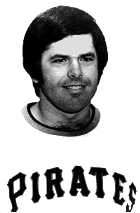
Wednesday, February 16, 2005
Pittsburgh Post-Gazette
Side by side with the sad news of his death earlier this week was the recollection of the most famous piece of pitching by Nelson Kelley Briles.
If you're a Pittsburgher of a certain age, you know it was Nellie Briles who put the Pirates in position win the 1971 World Series with a Game 5 masterpiece against the Baltimore Orioles. It was Briles, who had to sit out his turn in the National League Championship Series because of injury, who pitched a two-hit shutout and set the stage for Steve Blass' classic in Game 7.
That might have been the most famous performance of Briles' career, but not his best.
On a pleasant late August night in 1972, when the Pirates seemed cruising toward another World Series appearance, Briles literally was inches away from an accomplishment that would have dwarfed his masterpiece of 10 months earlier.
The Pirates were playing the San Francisco Giants in a matchup of the NLCS participants from the previous year. But the Giants had stumbled that season and were 14 games under .500 and 21 1/2 games out of first place, which is why there were only 9,389 in the stands at Candlestick Park.
The Pirates were 30 games over .500 and had an 11 1/2-game lead in the National League East. Everyone knew they were going to the playoffs and most believed they would repeat as World Series champion. It was a team without a weakness. The batting order had Robert Clemente and Willie Stargell in the middle, flanked by the likes of Al Oliver, Manny Sanguillen, Dave Cash and Richie Hebner. The rotation was led by Blass and Dock Ellis. In the bullpen, closer Dave Giusti and left-hander Ramon Hernandez bordered on unhittable. The bench, with Vic Davalillo, Gene Clines, Rennie Stennett and Jose Pagan, was so good the team didn't falter when Clemente missed a long stretch because of an injury.
Briles was matched against Juan Marichal, a future Hall of Famer and one of the dominant pitchers in the game. Marichal gave up a leadoff single to Davalillo, who was quickly erased on Cash's double-play grounder. Clemente reached second on an error and Stargell followed with a run-scoring double. Marichal then picked Stargell off second base.
Briles had a run and he knew it might be all he'd get against the great Marichal. It was. But it made no difference.
The Giants went up and down in order through the first six innings. The tension was mounting at Candlestick. Not a hit, not a walk, not a baserunner. Everyone knew Briles was working on a perfect game.
In the seventh, Bobby Bonds and Chris Speier led off with infield outs. That brought up Ken Henderson, the quintessential journeyman. Henderson was a lifetime .257 hitters with seven teams. He ripped a shot toward right that was rising as it reached Stargell at first base. Willie jumped. The ball was catchable. But not this time. It hit off Stargell's glove and went to right field. The official scorer had no choice. Even though the ball was catchable, it clearly was a hit.
Briles never wavered. He retired Willie McCovey to end that inning and got the next six Giants.
Briles, as classy as a player as he was in later life as a Pirates executive, handed the postgame interviews like a pro. But afterward, as the Pirates boarded their bus for a trip to the airport and a flight to Los Angeles, he wondered aloud what the fame of a perfect game might have done for his budding entertainment career.
In the early 1970s, the salaries of baseball players weren't much more than the average man. Some of the younger players made about as much as a newspaper reporter. Briles had capitalized on his World Series fame to kick off a singing career. He was good. He made some television and nightclub appearances. The publicity that comes with a perfect game might have sent that career spiraling.
But it wasn't to be. His near masterpiece became a forgotten one-hitter. The Pirates famously lost to the Cincinnati Reds in the playoffs on a wild pitch and finished under .500 the next season. General manager Joe Brown believed moves had to be made and Briles was sent to Kansas City.
Briles bounced around baseball after that with four teams before retiring after the 1978 season with a 129-112 record.
Eventually, he made his way back to the Pirates' family, where he was vice president of corporate projects at the time of his death.
He was a wonderful asset for the franchise, a humble hero of rare class who was equally at ease with the common fan or the business tycoon.
Funeral services will be at 11 a.m. Saturday at the First Presbyterian Church in Greensburg. Viewing will be from 7-9 p.m. tomorrow and 2-7 p.m. Friday at the Kepple Graft Funeral Home in Greensburg.
Nellie Briles never got that perfect game, but he always remained baseball's perfect gentleman.
(Bob Smizik can be reached at bsmizik@post-gazette.com.)
No comments:
Post a Comment